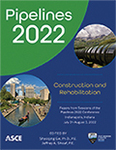Validation Procedure to Assess the Reliability of Artificial Intelligence Models in Sewer Defect Recognition
Publication: Pipelines 2022
ABSTRACT
Sewer defect recognition and smart models have been in development for the past few decades. A number of algorithms were used under the artificial intelligence (AI) domain, including computer vision, machine learning, and expert systems to improve the traditional sewer assessment process. Despite the significant contributions in this field, few works have comprehensively demonstrated a systematic approach to validate the developed algorithms. Validation is integral to verify the applicability and test the reliability of the model to precisely and accurately classify and detect sewer defects. Besides, it assists researchers/engineers to pinpoint the limitations of any model developed for improvements so it can be applicable on a larger scale. Albeit this process may seem to be simple, the validation gets complicated while running multiple AI algorithms on videos rather than fewer frames or images. Therefore, it is important to shed light on the validation process to test AI algorithms in the detection and recognition of sewer defects. This paper will present the use of the Intersection over Union (IoU) in such application. The validation and testing process is implemented on SewerLogic’s detection and recognition modules. This paper contributes to the body of knowledge and the engineering profession by demonstrating a systematic and comprehensive validation process of any AI tool developed to detect and classify sewer defects.
Get full access to this article
View all available purchase options and get full access to this chapter.
REFERENCES
ASCE. 2021. Infrastructure Report Card. <https://infrastructurereportcard.org/wp-content/uploads/2020/12/Wastewater-2021.pdf>accessed on November 21, 2021.
Davies, J. P., Clarke, B. A., Whiter, J. T., and Cunningham, R. J. (2001). Factors influencing the structural deterioration and collapse of rigid sewer pipes. Urban water, 3(1-2), 73–89.
Kaddoura, K., and Atherton, J. (2021). Smart and automated sewer pipeline defect detection and classification. In Pipelines 2021 (pp. 135–143).
Kaddoura, K., and Zayed, T. (2018b). An integrated assessment approach to prevent risk of sewer exfiltration. Sustainable cities and society, 41, 576–586.
Kaddoura, K., Zayed, T., and Hawari, A. H. (2018a). Multiattribute utility theory deployment in sewer defects assessment. Journal of Computing in Civil Engineering, 32(2), 04017074.
Montesinos López, O. A., Montesinos López, A., and Crossa, J. (2022). Overfitting, Model Tuning, and Evaluation of Prediction Performance. In Multivariate Statistical Machine Learning Methods for Genomic Prediction (pp. 109–139). Springer, Cham.
McKim, R. A., and Sinha, S. K. (1999). Condition assessment of underground sewer pipes using a modified digital image processing paradigm. Tunnelling and Underground Space Technology, 14, 29–37.
Padilla, R., Netto, S. L., and da Silva, E. A. (2020, July). A survey on performance metrics for object-detection algorithms. In 2020 International Conference on Systems, Signals and Image Processing (IWSSIP) (pp. 237–242). IEEE.
Pan, X., Clarke, T. A., and Ellis, T. J. (1994, October). Detection and tracking of pipe joints in noisy images. In Videometrics III (Vol. 2350, pp. 136–147). International Society for Optics and Photonics.
Rezatofighi, H., Tsoi, N., Gwak, J., Sadeghian, A., Reid, I., and Savarese, S. (2019). Generalized intersection over union: A metric and a loss for bounding box regression. In Proceedings of the IEEE/CVF Conference on Computer Vision and Pattern Recognition (pp. 658–666).
SewerLogic. (2021). SewerLogic: Technology to improve the speed and accuracy of sewer inspection programs. <http://sewerlogic.com/files/AECOM_SewerLogic_Flyer_2021.pdf>accessed on January 30, 2022.
Xu, K., Luxmoore, A. R., and Davies, T. (1998). Sewer pipe deformation assessment by image analysis of video surveys. Pattern Recognition, 31(2), 169–180.
Zheng, Y., Zhang, D., Xie, S., Lu, J., and Zhou, J. (2020, August). Rotation-robust intersection over union for 3d object detection. In European Conference on Computer Vision (pp. 464–480). Springer, Cham.
Information & Authors
Information
Published In
History
Published online: Jul 28, 2022
Authors
Metrics & Citations
Metrics
Citations
Download citation
If you have the appropriate software installed, you can download article citation data to the citation manager of your choice. Simply select your manager software from the list below and click Download.
